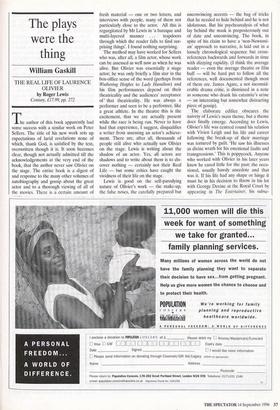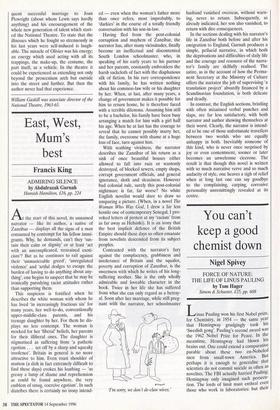The plays were the thing
William Gaskill THE REAL LIFE OF LAURENCE OLIVIER by Roger Lewis Century, EZ99, pp. 272 The author of this book apparently had some success with a similar work on Peter Sellers. The title of his new work sets up expectations of lurid revelations none of which, thank God, is satisfied by the text, overwritten though it is. It soon becomes clear, though not actually admitted till the acknowledgements at the very end of the book, that the author never saw Olivier on the stage. The entire book is a digest of and response to the many other volumes of autobiography and gossip about the great actor and to a thorough viewing of all of the movies. There is a certain amount of fresh material — one or two letters, and interviews with people, many of them not particularly close to the actor. All this is regurgitated by Mr Lewis in 'a baroque and multi-layered manner ... trapdoors through which the reader falls to find sur- prising things'. I found nothing surprising. The method may have worked for Sellers who was, after all, a film actor, whose work can be assessed as well now as when he was alive. But Olivier was essentially a stage actor; he was only briefly a film star in the box-office sense of the word (perhaps from Wuthering Heights to Lady Hamilton) and his film performances depend on their theatricality and the audiences' acceptance of • that theatricality. He was always a performer and seen to be a performer, like a great athlete. In the theatre this is the excitement, that we are actually present while the race is being run. Never to have had that experience, I suggest, disqualifies a writer from assessing an actor's achieve- ment. There are, after all, thousands of people still alive who actually saw Olivier on the stage. Lewis is writing about the shadow of an actor. Yes, all actors are shadows and to write about them is to dis- cover nothing — certainly not their Real Life — but some critics have caught the vividness of their life on the stage.
Lewis is good on the self-parodying nature of Olivier's work — the make-up, the false noses, the carefully prepared but
unconvincing accents — the bag of tricks that he needed to hide behind and he is not idolatrous. But his psychoanalysis of what lay behind the mask is preposterously out of date and unconvincing. The book, in spite of his claim to have a Mon-Newtoni- an' approach to narrative, is laid out in a loosely chronological sequence but cross- references backwards and forwards in time with dizzying rapidity. (I think the average reader — even the average theatre or film buff — will be hard put to follow all 'the references, well documented though most of them are. James Agate, a not inconsid- erable drama critic, is dismissed in a note as someone who drank his catamite's urine — an interesting but somewhat distracting piece of gossip).
The elaborate edifice obscures the naivety of Lewis's main theme, but a theme does finally emerge. According to Lewis, Olivier's life was centred round his relation with Vivien Leigh and his life and career following the break-up of their marriage was tortured by guilt. 'He saw his illnesses as divine wrath for his emotional faults and transgressions.' This is poppycock. Anyone who worked with Olivier in his later years knew he cared little for the past; the occa- sional, usually bawdy anecdote and that was it. If his life had any shape or hinge it must be in his decision to throw in his lot with George Devine at the Royal Court by appearing in The Entertainer, his subse-
quent successful marriage to Joan Plowright (about whom Lewis says hardly anything) and his encouragement of the whole new generation of talent which start- ed the National Theatre. To state that the illnesses which he fought so strenuously in his last years were self-induced is laugh- able. The miracle of Olivier was his energy; an energy which used acting with all its trappings, the make-up, the costume, the part itself, as a vehicle. In the theatre it could be experienced as extending not only beyond the proscenium arch but outside into the street and further. But then the author never had that experience.
William Gaskill was associate director of the National Theatre, 1963-65.



































































 Previous page
Previous page